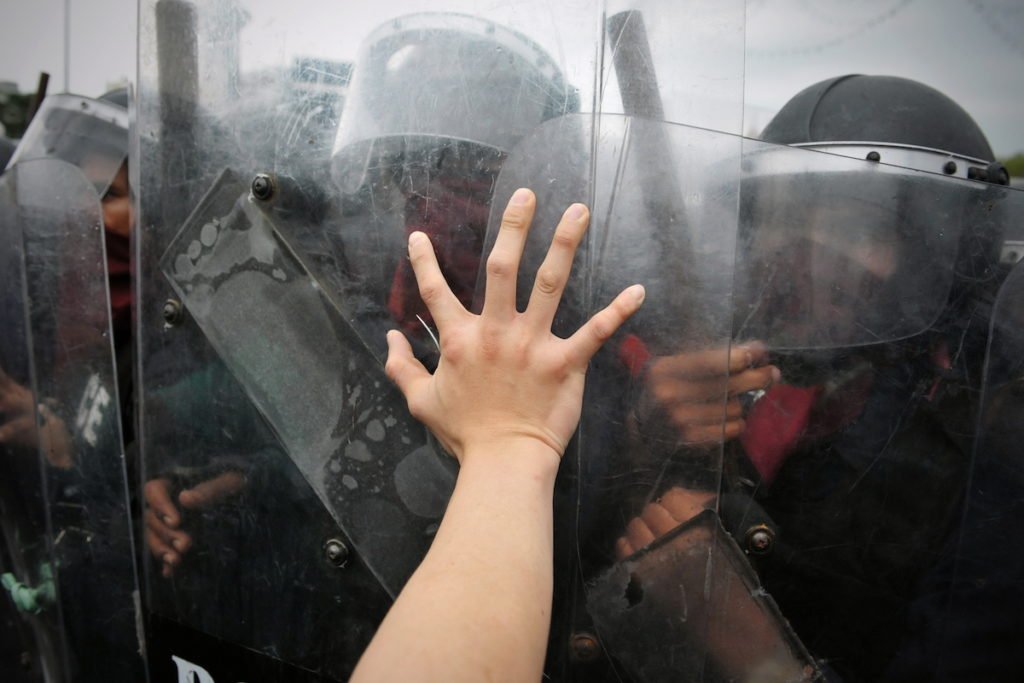Penal Code 243b and 243c are the California laws that define the crime of battery on a peace officer or police officer. A person commits this offense by willfully and unlawfully touching a peace officer or other protected official in a harmful or offensive manner.
Note that officers may write the citation as 243(b) PC, 243 (c)(1) PC or 243 (c)(2) PC.
Note that to constitute an offense, the touching must come while the officer is engaged in the performance of official duties. In addition to police officers, some of the other protected persons covered by this code section include custodial officers, firefighters, and emergency medical technicians (EMTs) or paramedics.
Examples of unlawful acts
- stomping on an officer’s foot and scratching him while resisting arrest.
- throwing a frozen bottle of water at a police officer during a protest.
- pushing a paramedic as the responder provides medical treatment/medical care.
Legal Defenses
A person that allegedly violates these laws can challenge the allegations with a legal defense. A few common defenses include defendants showing that:
- they acted in self-defense,
- they did not act willfully, and/or
- the alleged victim was not engaged in the performance of their duties.
Penalties
Violations of these California Penal Code Sections are typically charged as misdemeanors and are punishable by:
- custody in county jail for up to one year, and/or
- a maximum fine of $2,000.
Note, though, that if the battery causes an injury requiring medical treatment, then the crime becomes a wobbler.
A wobbler is an offense that a prosecutor can charge as either a misdemeanor or a felony. Felony battery of a law enforcement officer is punishable by:
- imprisonment in county jail for up to three years, and/or
- a maximum fine of $10,000.
|
California battery offense |
Penalties |
| Simple battery (PC 242) | Misdemeanor: Up to 6 months in jail and/or $2,000 |
| Aggravated battery causing serious bodily injury (PC 243(d)) | Misdemeanor: Up to 1 year in jail and/or $1,000
or Felony: 2, 3, or 4 years in jail (plus 3 to 6 years if the victim suffers great bodily injury) and/or up to $10,000 |
| Battery on a custodial officer (PC 243.1) | Felony: 16 months, 2 years, or 3 years in jail (or 2, 3, or 4 years if the victim sustains great bodily injury) |
| Battery on a peace or police officer (PC 243(b) & (c))
and |
No injury Misdemeanor: Up to 1 year in jail and/or $2,000 |
|
With injury that requires medical treatment Misdemeanor: Up to 1 year in jail and/or $2,000 or Felony: 16 months, 2 years, or 3 years in jail and/or up to $10,000 |
|
| Domestic battery (PC 243(e)(1)) | Misdemeanor: Up to 6 months in jail and/or $2,000 |
| Sexual battery (PC 243.4) | Misdemeanor: Up to 6 months in jail (or 1 year if there was an aggravating factor) and/or $2,000 (or $3,000 if the victim was your employee) plus Tier I sex offender registration for 10 years.
or Felony: 2, 3, or 4 years in prison (or an extra 3 to 5 years if the victim was seriously hurt) and/or up to $10,000 plus Tier III sex offender registration for life (usually). |
Our California criminal defense attorneys will address the following in this article:
- 1. What is considered to be a “battery on a police officer”?
- 2. Can an accused raise a legal defense?
- 3. What are the penalties?
- 4. Can a person get a California Penal Code 243 violation expunged?
- 5. Are there similar crimes?<
1. What is considered to be a “battery on a police officer”?
To prove that a defendant committed battery on a police officer, the prosecutor must prove all of the following elements of the crime:
- the alleged victim was a peace officer or other protected person performing his/her duties,
- the defendant willfully and unlawfully touched the victim in a harmful or offensive manner, and
- when the defendant acted, he/she knew, or reasonably should have known, that the victim was a peace officer or other protected person engaged in the performance of his/her duties.[1]
“Other protected persons” under this statute include:
- custodial officers,
- firefighters,
- EMTs or paramedics,
- California highway patrolman,
- lifeguards,
- animal control officers,
- private security guards,
- process servers,
- employees of a probation department, and
- doctors and nurses providing emergency medical care.[2]
Note that someone commits an act “willfully” when he or she does it:
- willingly, or
- on purpose.[3]
Further, the slightest touching can be enough to commit a battery if it is done in a rude or angry way. Making contact with another person, including through his or her clothing, is enough.[4]
The touching can also be done indirectly. Indirectly means that a person causes an object or someone else to touch the peace officer or other protected person.[5]

Battery on a peace officer can be a felony or a misdemeanor in California depending on the injuries.
2. Can an accused raise a legal defense?
An accused can challenge criminal charges under these laws with any defense that raises a reasonable doubt that he/she committed the crime.
Three common defenses in these cases include accused persons showing that:
- they acted in self-defense.
- they did not act willfully.
- the officer was not engaged in performing his/her official duties.
2.1 Self-defense
A defendant can always challenge a PC 243 allegation by showing that he/she acted in self-defense.[6] Perhaps, for example, the accused was trying to fight off an instance of police misconduct or brutality.
2.2 No willful act
Recall that defendants are only guilty of this offense if they acted willfully. Therefore, a defense is for an accused to show that he/she did not act on purpose. Perhaps, for example, the accused touched an officer on accident.
2.3 Officer not engaged in official duties
Recall too that an accused is only guilty of battery on a police officer if he/she committed the battery while the officer was in the performance of his/her official duties. This means a defendant can always challenge peace officer charges by showing that an officer was not performing these duties when the battery took place.
3. What are the penalties?
Most violations of Penal Code 243 PC are charged as misdemeanors.
Misdemeanor battery is punishable by:
- custody in county jail (as opposed to state prison) for up to one year, and/or
- a maximum fine of $2,000.[7]
But note that if a battery inflicts a physical injury on an officer that requires medical treatment, then the battery becomes a wobbler.
A wobbler is a crime that a prosecutor can charge as either a misdemeanor or a felony depending on:
- the facts of the case, and
- the defendant’s criminal record.
If charged as a felony, then the battery is punishable by:
- custody in jail for up to three years, and/or
- a maximum fine of $10,000.[8]

Depending on the circumstances, people charged with violating PC 243b may also face charges for resisting arrest.
4. Can a person get a California Penal Code 243 violation expunged?
Yes. Persons convicted of battery on a police officer can get the conviction expunged, per Penal Code 1203.4.
This is true provided that the defendant successfully completes his/her:
- jail sentence, or
- probation term (whichever was imposed).
5. Are there similar crimes?
There are three crimes related to the commission of a battery on a peace officer. These are:
- resisting arrest – PC 148,
- resisting an executive officer – PC 69, and
- simple battery – PC 242.
5.1 Resisting arrest – PC 148
Under Penal Code 148 PC, California law defines resisting arrest as willfully resisting, delaying, or obstructing law enforcement officers or EMTs in the performance of their official duties.
Note that while PC 243 protects several different types of officers and professionals, this code section is limited to protecting:
- police officers, and
- emergency medical technicians.
5.2 Resisting an executive officer – PC 69
Penal Code 69 PC is the California statute making it a crime to resist an executive officer.
“Resist” means using threats or violence to prevent executive officers from performing their duties, or resisting executive officers in the performance of their duties.
Unlike Penal Code 243, this statute pertains to “executive officers,” which are defined as government officials who may use their own discretion in performing their duties.
5.3 Simple battery – PC 242
Under Penal Code 242 PC, California law defines simple battery as “any willful and unlawful use of force or violence upon the person of another.”
The definition of a battery under this statute carries the same definition as a battery under PC 243. Further, it can occur with:
- any slight touching, and
- any indirect touching.

Call our law firm for legal advice. We offer free consultations.
For additional guidance or to discuss your case with a criminal defense lawyer, we invite you to contact our law firm at the Shouse Law Group. Our attorneys provide both free consultations and legal advice you can trust.
They also represent clients throughout California, including those in Los Angeles, San Diego, and Orange County.
For a similar law in Nevada, please see our article on Nevada “Battery on a Peace/ Police Officer” Laws.
Legal References
[1] CALCRIM No. 945 – Battery Against a Peace Officer. Judicial Council of California Criminal Jury Instructions (2020 edition). As to an officer being engaged in his/her official duties, see People v. Pennington (2014) 229 Cal.App.4th 1376.
[2] California Penal Code 243 PC.
Penal Code 243 (b) PC states that “When a battery is committed against the person of a peace officer, custodial officer, firefighter, emergency medical technician, lifeguard, security officer, custody assistant, process server, traffic officer, code enforcement officer, animal control officer, or search and rescue member engaged in the performance of his or her duties, whether on or off duty, including when the peace officer is in a police uniform and is concurrently performing the duties required of him or her as a peace officer while also employed in a private capacity as a part-time or casual private security guard or patrolman, or a nonsworn employee of a probation department engaged in the performance of his or her duties, whether on or off duty, or a physician or nurse engaged in rendering emergency medical care outside a hospital, clinic, or other health care facility, and the person committing the offense knows or reasonably should know that the victim is a peace officer, custodial officer, firefighter, emergency medical technician, lifeguard, security officer, custody assistant, process server, traffic officer, code enforcement officer, animal control officer, or search and rescue member engaged in the performance of his or her duties, nonsworn employee of a probation department, or a physician or nurse engaged in rendering emergency medical care, the battery is punishable by a fine not exceeding two thousand dollars ($2,000), or by imprisonment in a county jail not exceeding one year, or by both that fine and imprisonment.”
Penal Code 243 (c) (1) PC states that “When a battery is committed against a custodial officer, firefighter, emergency medical technician, lifeguard, process server, traffic officer, or animal control officer engaged in the performance of his or her duties, whether on or off duty, or a nonsworn employee of a probation department engaged in the performance of his or her duties, whether on or off duty, or a physician or nurse engaged in rendering emergency medical care outside a hospital, clinic, or other health care facility, and the person committing the offense knows or reasonably should know that the victim is a nonsworn employee of a probation department, custodial officer, firefighter, emergency medical technician, lifeguard, process server, traffic officer, or animal control officer engaged in the performance of his or her duties, or a physician or nurse engaged in rendering emergency medical care, and an injury is inflicted on that victim, the battery is punishable by a fine of not more than two thousand dollars ($2,000), by imprisonment in a county jail not exceeding one year, or by both that fine and imprisonment, or by imprisonment pursuant to subdivision (h) of Section 1170 for 16 months, or two or three years.”
Penal Code 243 (c) (2) PC states that “When the battery specified in paragraph (1) is committed against a peace officer engaged in the performance of his or her duties, whether on or off duty, including when the peace officer is in a police uniform and is concurrently performing the duties required of him or her as a peace officer while also employed in a private capacity as a part-time or casual private security guard or patrolman and the person committing the offense knows or reasonably should know that the victim is a peace officer engaged in the performance of his or her duties, the battery is punishable by a fine of not more than ten thousand dollars ($10,000), or by imprisonment in a county jail not exceeding one year or pursuant to subdivision (h) of Section 1170 for 16 months, or two or three years, or by both that fine and imprisonment.”
[3] CALCRIM No. 945. See also United States v. Colon-Arreola (2014) 753 F.3d 841; and, People v. Lara (1996) 44 Cal.App.4th 102.
[4] CALCRIM No. 945. See also In re B.L. (2015) 239 Cal.App.4th 1491; and, People v. Myers (1998) 61 Cal.App.4th 328.
[5] CALCRIM No. 945. See also In re B.L., supra.
[6] See, for instance, CALCRIM No. 945.
[7] California Penal Code 243 PC.
[8] See same. See also People v. Gutierrez (2009) 174 Cal.App.4th 515.
